As my twentieth birthday loomed, an unspoken tension developed in the house. It was a subject that no one wanted to raise, not even my mother who by then had completed her period of rehabilitation and the speech therapist had restored her tongue to it’s former glory. She got about the house slowly, moaning and groaning a lot but there was nothing new about that. Horrie did the washing on Saturdays, Rosely the ironing, Howie the dusting, I the vacuuming and we all got into the bathroom, laundry and kitchen cleaning chores on a piecemeal basis.
Still, though we did most of the work, my mother retained the responsibility and did all the worrying. Mostly she did so while under a blanket on the couch and apparently absorbed in her knitting.
“Look at those fingermarks on the glass cabinet,” she would sigh. “Oh I don’t know. The work around here is never done. It just goes on and on...”
Meanwhile I sprayed the glass-cleaner and Rosely swished with the lint-free cloth while Horrie told her to be careful with the glass and Howie’s sharp little eyes detected any bits she had missed.
Horrie did the shopping, Rosely the cooking, I the garbage and Howie kept the benches and cupboards and tabletop immaculate. And my nineteenth year drew closer to its end and not a word was said about the significance of that.
…O Romeo, Romeo! Wherefor art thou Romeo?…
…Wisely and slow; they stumble that run fast…
…O, I am fortune’s fool…
…Night’s candles are burnt out, and jocund day
Stands tiptoe on the misty mountain tops…
…I do remember well where I should be,
And there I am: Where is my Romeo?…
…Flower as she was, deflowered by him.
Death is my son-in-law…
Shakespeare’s Romeo and Juliet wasn’t quite the catastrophic disaster that The Merchant of Venice was in the hands of the boys at Moorabbin Tech, but it went close. The school had acquired a new hall in my last year there and it was to here I returned one wintery night to see an amateur production of the play. I really wasn’t interested, didn’t want to go, but my best friend’s mother had free tickets and there was begging and pleading and other sooky stuff and I just had to do it. Look, I didn’t even like West Side Story, so what hope did they have? None at all. It was woeful, stodgy as the 1954 movie version, static mumbled delivery and full of fluffed lines. I hated it. I vowed to avoid Shakespeare for the rest of my life. He wrote in what was virtually a foreign language anyway.
This resolution lasted about a year and just three years later, I would be dragged kicking and screaming by the current object of my sexual fantasies to yet another version of R&J, a big lavish movie made by some Italian named Zefferelli. I couldn’t believe how good it was. I wondered what the scriptwriters had done to make The Bard’s text so suddenly intelligible. Since then I’ve seen three even greater versions—it is amazing how your perspective can change. I’ve grown to kinda like West Side Story too—it has some very good songs and Natalie Wood mimes magnificently. But I have to tell you that the production I saw at Moorabbin Tech Hall was just plain dreadful.
The story traces back to 2nd Century Greece with Anthia and Abrocomas by Xenophon Ephesius. The star-crossed lovers were a fully established legend by 1303 most notably in Novellino by Massuccio Salernitano in 1476. The final touch of their names was added—Romeo and Guilietta by Arthur Brooke who rendered it into English verse in 1562—from which version Shakespeare borrowed the metre—and William Paynter in prose in 1567. A earlier English theatre version, La Hadriana by Luigi Proto in 1578, also existed and seems to have influenced the outcome. Shakespeare had his go after 1591 but before 1596.
Shakespeare Scoreboard:
Original plays 2. (MacBeth) (Henry IV Part One)
Plays ripped off from contemporaries 5. (Merchant from Marlowe’s Jew of Malta) (Hamlet from Kyd and Aeschylus)(Antony and Cleopatra—everywhere)(Julius Caesar—same place) (Romeo and Juliet from Brooke’s Romeo and Guilietta)
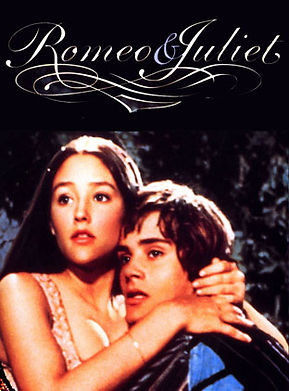
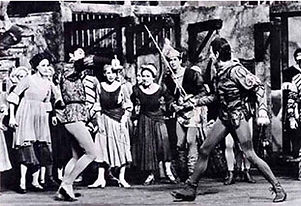
… A pair of star-cross’d lovers…
…The two hours’ traffic of our stage…
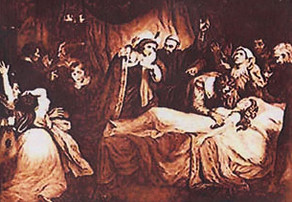
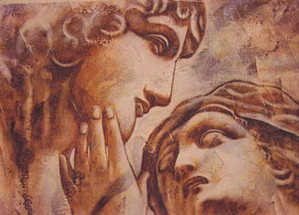
…Saint-seducing gold…
…My lips, two blushing pilgrims, ready stand
To smooth that rough touch with a tender kiss…

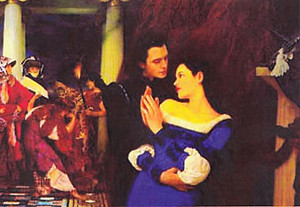
…For you and I are past our dancing days…
…For I ne’er saw true beauty till this night…


… But soft! What light from yonder window breaks?
It is the east, and Juliet is the sun…
…Good night, good night! Parting is such sweet sorrow…

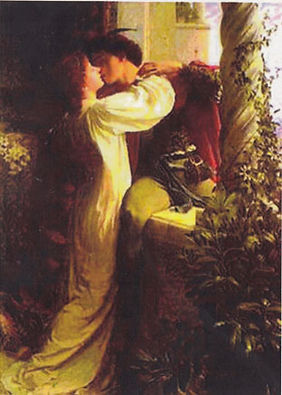
…Tis but thy name that is my enemy…
…What’s in a name? That which we call a rose
By any other name would smell as sweet…




…Come, come with me, and we will make short work…
…A plague o’ both your houses!
They have made worm’s meat of me…
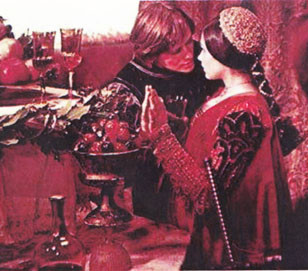


…But I, a maid, die maiden-widowed…
…There on the ground, with his own tears made drunk…

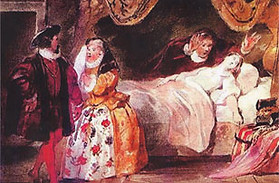

…Thank me no thankings, nor proud me no prouds…
…Come weep with me--past hope, past cure, past help!…



…’Tis an ill cook that cannot lick his own fingers…
…To follow this fair course unto her grave…
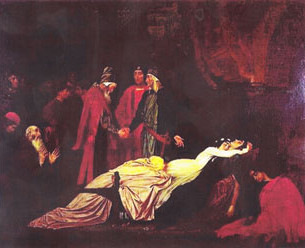
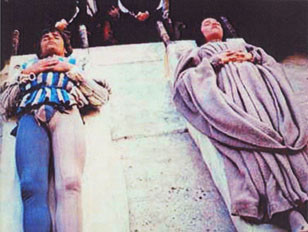

…The sun for sorrow will not show its head…
…For never was a story of more woe
Than this of Juliet and her Romeo…
